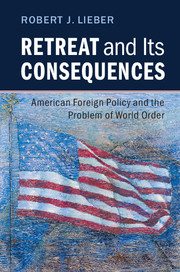Book contents
- Frontmatter
- Dedication
- Contents
- List of figures and tables
- Acknowledgments
- Introduction
- 1 Foreign policy retreat and the problem of world order
- 2 Burden sharing with Europe: problems of capability and will
- 3 Middle East policy: regional conflicts and threats to national interest
- 4 BRICS: stakeholders or free-riders?
- 5 Retreat and its consequences
- 6 Can America still lead – and should it?
- Index
4 - BRICS: stakeholders or free-riders?
Published online by Cambridge University Press: 05 May 2016
- Frontmatter
- Dedication
- Contents
- List of figures and tables
- Acknowledgments
- Introduction
- 1 Foreign policy retreat and the problem of world order
- 2 Burden sharing with Europe: problems of capability and will
- 3 Middle East policy: regional conflicts and threats to national interest
- 4 BRICS: stakeholders or free-riders?
- 5 Retreat and its consequences
- 6 Can America still lead – and should it?
- Index
Summary
This past month may be remembered as the moment the United States lost its role as the underwriter of the global economic system.
– Lawrence Summers, Former Treasury Secretary and economic adviser to President Obama, on China's establishment of the Asian Infrastructure Investment Bank over the objections of the USIn an increasingly globalized world, power has become more diffused. Especially since the start of the twenty-first century, the BRICS (Brazil, Russia, India, China, and South Africa) and others have emerged as significant actors. The appearance of these and other rising powers is not entirely new, but together they represent an increasing presence in economic, cultural, political, and even security terms. At the same time, the relative weight of Europe and Japan has seemed to ebb as these traditional centers of power have experienced economic and demographic stagnation. Political and scholarly observers have tended to greet these changes as heralding a new era in which BRICS would not only become far more influential in world affairs, but would act to reshape, sustain, and promote international institutions and regimes in an increasingly multipolar world. Thus, in writing about the BRICS, a Brazilian scholar argues that rather than playing a disruptive role, they seek to promote the emergence of a rule-based international order and to pressure America and its allies to more consistently adhere to global norms and rules.
But are these assumptions accurate? Are the BRICS increasingly acting as responsible stakeholders, or is the international order becoming more multipolar without becoming more multilateral? I argue in this chapter that, in practice and across a wide range of issue areas, the BRICS have been less rather than more cooperative in sustaining international institutions and international order, and that in these circumstances, the engagement of the United States is not only essential for reasons of national interest, but that it is vital for sustaining global order. With these considerations in mind, I address here the interplay between the role of the United States and that of BRICS. The question of America's position is central, not only in terms of national interest, but also because the United States has played a unique role as the world's leading provider of public goods. Consequently, a combination of American retrenchment and BRICS abdication would be likely to weaken multilateral institutions and other elements of international order.
- Type
- Chapter
- Information
- Retreat and its ConsequencesAmerican Foreign Policy and the Problem of World Order, pp. 71 - 88Publisher: Cambridge University PressPrint publication year: 2016



